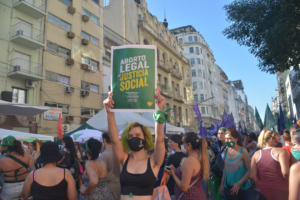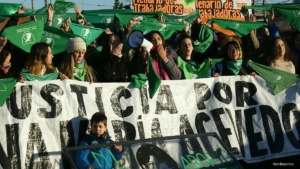
The Pope Comes to Havana & Washington
As he has to date, Pope Francis will remain pragmatic and realistic in pursuing his principles and goals in both the US and Cuba.
This post is also available in: Spanish
History was made on December 30, 2020, when the Senate of Argentina voted to legalize abortion during the first 14 weeks of pregnancy. As a result, the number of women in Latin America with access to legal abortion has jumped significantly, from 3 percent to 10 percent.
This was a victory for campaigners, but their fight is far from over. The day after the news in Argentina, President Jair Bolsonaro criticized the decision and stated that abortion would never be permitted in Brazil as long as he was president. And on January 21, Honduras changed its constitution to make it virtually impossible to legalize abortion, which is punishable for up to ten years in prison.
Latin America and the Caribbean (LAC) continues to be one of the most restrictive regions in the world when it comes to reproductive health laws and policies, particularly abortion. As of 2021, abortion is entirely prohibited in Nicaragua, Honduras, El Salvador, Haiti, Jamaica, Dominican Republic, and Suriname. It is accepted in most LAC countries under certain conditions – such as rape, fatal fetal anomaly, or to save the mother’s life – and it is allowed on demand in Uruguay, Cuba, Mexico City and Oaxaca, Guyana, French Guiana, and now Argentina.
Of course, abortions will continue to take place regardless of legal restrictions. Harsh laws and limited access force women to seek unsafe procedures, which often results in severe complications or even death. Although progress has been made in the fight to decriminalize abortion, limited access to the procedure remains a human rights issue, a public health crisis, and a problem for democracy.
Sexual and reproductive rights (SRR) guarantee access to reproductive health services, comprehensive sexuality education, and safe contraception and abortion. As part of a government’s social contract with their citizens, they must protect SRR, guarantee residents’ health, and correct social inequalities. Some restrictive abortion laws infringe on a number of other human rights guarantees, including the right to privacy and the right to due process.

Most Latin American countries have signed and ratified treaties promising to end discrimination against women and uphold their reproductive freedom, including the UN 1981 Convention for the Elimination of All Forms of Discrimination against Women (CEDAW) and the Santiago Commitment at the XIV regional Conference on Women in LAC. Yet many of the signatories continue to have some of the most restrictive abortion laws in the world. In Honduras, these treaties are regarded as on the same level as their constitution, yet abortion continues to be criminalized.
Restricted access to abortion has contributed to a serious public health crisis. Between 2015 and 2019, an estimated 5.4 million women had an abortion in LAC. Three out of four abortions that occur in Africa and Latin America are unsafe. About 760,000 women in the region are treated annually for complications from an illegal abortion, and approximately 10 percent of all maternal deaths resulted from one. A significant number of maternal deaths in Latin America could have been prevented by universal access to family planning.
These alarming statistics have been exacerbated by the coronavirus pandemic. During Covid-19, as gender-based and domestic violence have increased in the region, so will unwanted pregnancies. It is estimated that the pandemic resulted in “2.2 million unwanted pregnancies, more than 1 million abortions, 3,900 maternal deaths and 51,400 child deaths” by the end of 2020. Even in countries where abortion is legal, there has been a decrease in the coverage of sexual and reproductive health services because of Covid-19, and more women have faced barriers when trying to access abortions. A greater number of unintended pregnancies will result in more unsafe abortions, hence more medical complications, maternal deaths, and imprisoned women and medical practitioners.
The Catholic and Evangelical churches continue to wield significant religious, political, and societal influence in LAC. Although declining, religion remains crucial to the region’s cultural identity. Additionally, there has been a growing number of more conservative, evangelical churches, especially in Central America, where abortion laws are the strictest. In Nicaragua, therapeutic abortion was eliminated in 2007 due to an alliance between the Ortega government and the evangelical-religious sector. These conservative forces have fostered the concept of “gender ideology,” which casts access to abortion, reproductive rights, and other gender equity policies as threats to traditional families and values.
Abortion stigma is prevalent in the region, even in countries with more liberal laws, as shown in 2018 study of abortion in Uruguay. Even though the procedure is allowed under certain conditions in most LAC countries, there is still a lack of access to information among citizens, and some medical providers or judges, like in Brazil, still effectively deny women abortion services, even when protected by law.
Finally, high-quality reproductive health services in the region are still more accessible to upper class women, who often have better access to contraceptives and private abortions, while other groups have to rely on public health facilities. In places where abortion is completely restricted, women who cannot afford private treatment or travel must go to public facilities in the case of a complication, where they risk being reported to the police. These restrictions almost always endanger the most vulnerable women, including the poor and rural, indigenous people, and Afro-descendants.
Regarding abortion access, each country’s situation is different, but the most dangerous cases are in Central America. In El Salvador, for example, women experiencing botched abortions or miscarriages are often prosecuted on aggravated assault or homicide charges, a crime that can result in up to 40 years in prison. Health care providers can also face criminal charges for assisting in an abortion. Eighteen women are still in prison since the total ban was introduced in 1998. As is the case in most Central American countries, conservative parties have a stronghold in Congress and municipal governments and will block any measures to loosen the ban in the near future.

In Argentina, abortion reform was not easily achieved. Experts note that a combination of key factors, over the course of proposing 13 bills, finally led to a change in law: long-term mobilization of activists, a progressive executive government, and a large number of female representatives in parliament. Pro-choice Catholic Church members and groups have also played an important regional role. Activists have also shifted the conversation on abortion in many countries from a moral debate to emphasizing public health, pointing to how Uruguay framed the discussion.
The Argentine momentum of the “green wave” may positively affect movements in other countries. In Colombia, the constitutional court has agreed to consider a petition to remove abortion from the penal code, and in Mexico, Congress is considering two initiatives to loosen restrictions and remove criminal punishments in specific states. The Supreme Court in Brazil will soon rule on a 2018 legal challenge that would decriminalize abortion in the first 12 weeks of pregnancy. Congress in Chile is also debating a bill that seeks to allow elective abortion up to 14 weeks of pregnancy. Public opinion appears to be changing, depending on the country. In Mexico, a poll in 2020 showed that support for access to abortion rose dramatically from 29 percent in March to 48 percent in November.
Access to abortion is a human right. States should uphold the promises made in international treaties to protect SRR, and international organizations and regional actors need to hold signatories accountable. Civil society groups should continue to pressure governments to improve their data collection and transparency related to abortion access and unsafe procedures. Transnational advocacy networks are also crucial for information sharing and legitimizing efforts across borders.
Most importantly, countries should institutionalize a comprehensive package of essential reproductive and health services, including safe abortion care and contraception, in their national health systems. They should address the need for greater, equitable investments, taking into account the specific needs of poor and marginalized groups. Furthermore, governments must focus on capacity building to enforce and uphold abortion law equally and prevent its reversal while also addressing discriminatory social norms and gender stereotypes. Access to comprehensive reproductive services will result in fewer unintended pregnancies, fewer abortions, and fewer maternal deaths. For women to be full citizens of society, reproductive freedom is fundamental.
As he has to date, Pope Francis will remain pragmatic and realistic in pursuing his principles and goals in both the US and Cuba.
Recent protests for increased abortion access in Argentina, Brazil, Chile and beyond underscore the relationship between female insecurity and lack of access to reproductive healthcare in the region.
The latest Latin America Advisor video with Dr. Jarbas Barbosa, assistant director at the Pan American Health Organization (PAHO), on the Covid-19 pandemic in Latin America and the Caribbean.

 Video
Video